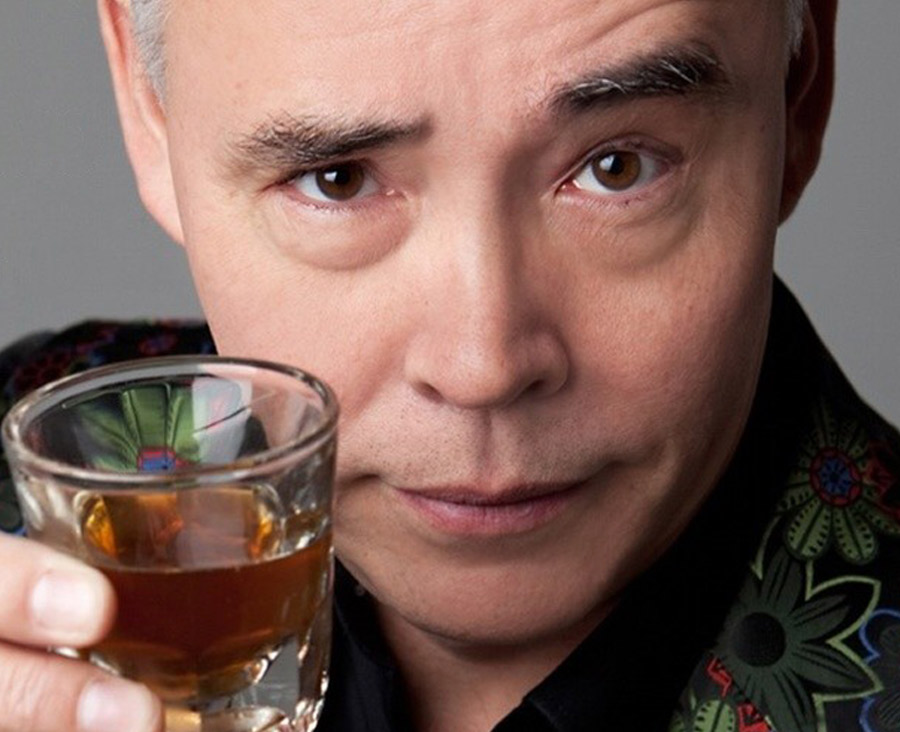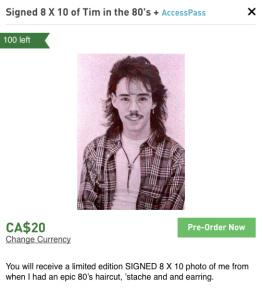When I was a bachlor(ette), every night, around 9 o’clock, I would pour myself a drink, and tune into Tonic. The evening jazz radio show on CBC was a dependably cool evening companion that turned an otherwise lonely apartment into a lively lounge. No longer single, I still tune into Tonic, but now it’s whenever I like using CBC Music’s radio player app (perfect for getting drunk off jazz while at work, doing the dishes, making dinner, or waiting for the hubster to get home).
Tonic‘s host, Tim Tamashiro, relates sweet stories of the human condition to the cool jazzy tunes he selects for each show. Tamashiro has recently launched a Pledge Music campaign to raise funds for a long-overdue “drinky jazz” album.
I had the privilege of interviewing Tim to ask about his fundraising drive, his drink of choice, his charity of choice, why jazz is so polarizing, and what on Earth he was thinking pairing a bolo tie with a mullet in the ’80s…
[question]What is “drinky jazz?”[/question]
[answer]There are two kinds of jazz: “thinky” and “drinky.” I sing drinky jazz. It’s an attitude to find the joy in jazz. It’s music after all. Have fun with it. My mission is to become the Jimmy Buffett of jazz.[/answer]
[question]Do you have a favourite drink?[/question]
[answer]I’m a beer and scotch drinker myself but I’ll try anything twice.[/answer]
[question]In your PledgeMusic video, you mention it’s a new music business, and it’s more about making friends than fans. After nearly 30 years in the business, how do you see the industry changing (for better or worse)?[/question]
[answer]The music business is completely different than when I began working in it. I worked for a major music label in the 1990’s. It was during the time of the mighty CD. You could sell anything on CD just as long as you could talk someone into playing it on the radio or Much Music and get a bunch of it to the record stores. In those days record labels had “priorities” which were the 10 per cent of albums that got 90 per cent of the attention. All decisions for what sold was based on what the record labels said they wanted to push. Today the music business is far more up to the individual. Today’s music career relies on interdisciplinary skills. Artists are “content creators” as Jack Conte describes though his Patreon website. Artists are in control of their art, message, social media, gigs, sales and image through creating content that matters to their friends. The artist builds their own pipelines to circles of people who are just like them. Every artist has a circle, so in my circle I’d like to make friends with the drinky jazz crowd. No record label required.[/answer]
[question]You’ve chosen The Canadian Cancer Society (CCS) as the charity to receive 5 per cent of your goal and 20 per cent after that. Could you tell us more about why you chose the CCS?[/question]
[answer]I’ve chosen to support the Canadian Cancer Society through the PledgeMusic campaign because both my parents suffered from cancer. I’ve driven them to their chemotherapy appointments to sit with them. I’ve seen my 90-year-old father benefit from chemotherapy and radiation therapy that extended his life. The progress made through the past good work of the CCS helped my family with cancer research and I will always support their good work.[/answer]
[question]Previously, you’ve described the jazz band Gypsophilia as “drinky.” What makes them “drinky” for you?[/question]
[answer]Gypsophilia sounds joyful in their approach to gypsy jazz. If I were a jazz sommelier I would suggest two bottles of French red wine at home while Gypsophilia plays on your stereo.[/answer]
[MORE: Gypsophilia talks to us about their new album here!]
[question]Jazz is so polarizing: some people love it with all their heart, and some can’t stand it. Why do you think this genre of music produces such extremes?[/question]
[answer]Jazz used to be the most popular music in the world. It was the music of the people because it was simple and exciting. Around 1939, jazz went into a new direction called bebop. Jazz was more complex than in its past. Studies shows that as music genres become more complicated the fewer people it appeals to. The one thing I don’t understand is how jazz became known as an umbrella genre that people like or dislike. I guess the same could be said about country or classical music. One thing I do know is that jazz is everywhere. Try going to a coffee shop or a fancy restaurant and not hearing jazz. It’s a bigger part of people’s lives than most realize.[/answer]
[question]What’s your routine when you prepare for Tonic? How do you choose what to play from such an overwhelming catalogue of options?[/question]
[answer]Tonic is a radio show for all Canadians that has a core library of jazz music to choose from. The catalogue is deep but it’s all hand-picked for its familiarity, mastery and Canadian-ness. Canadian musicians fly right alongside of the jazz masters and top jazz artists of today. My routine is to research each story extensively. Then I write each story with the intention of giving the listeners a story that matters. Then I work on polishing the stories with Catherine McClelland, producer of Tonic. The last piece of the puzzle is to record the show for broadcast. I research, write and record approximately 70 stories over six shows a week. It’s the best job in the world.[/answer]
[question]You’ve said “Music is important but it’s the fun and memorable moments that make your night.” We totally agree! What can really make a moment? What can ruin a moment?[/question]
[answer]There are two sides to every stage: the audience side and the performers side. The audience wants to enjoy their experience. The performers want the audience to enjoy their performance. A moment can be as simple as a two-way conversation. The spaces between the songs are just as important as the songs themselves. In fact, the spaces can change the song that follow completely.[/answer]
[question]For a steal ($1,000) you and a piano player will play a house ANYWHERE in Canada, and “We sleep at your house.” Are you worried? What kind of sleeping conditions are you guys hoping for (bare minimum)?[/question]
[answer]I’m a great lover of adventure and meeting new people. The $1000 probably isn’t a money maker but it is a friend maker. I could never be poor if I can make new friends.[/answer]
[question]What is going on in this limited edition photo of you from the ’80s anyway?[/question]
[answer]I lived the 80’s passionately. I’d like to share the cheese.[/answer]
Check out Tim doing his thing in this “vintage”music video of “The Tim Tamashiro Show” (brought to you by Baco Scent…)
Find Tim online:


